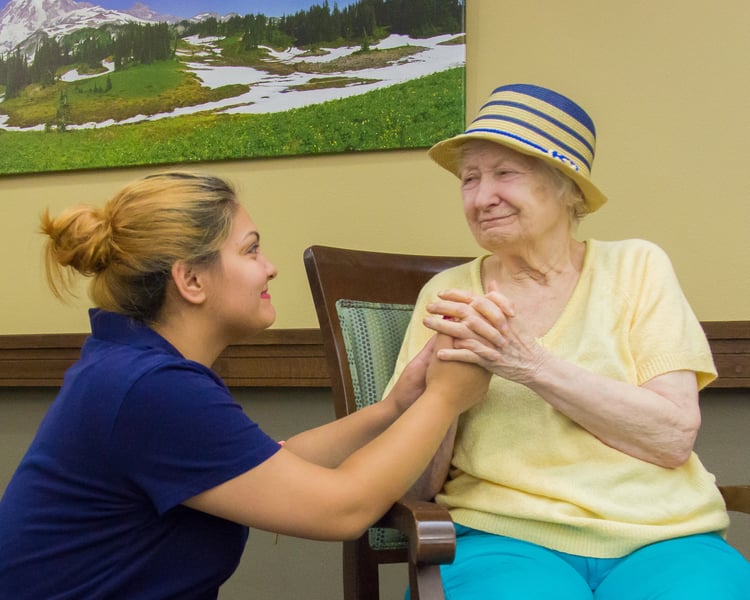Connection is the energy that exists between people when they feel seen, heard, and valued; when they can give and receive without judgment; and when they derive sustenance and strength from the relationship. - Brené Brown
It’s no secret that relationships can sustain us, but what does it really mean for seniors to have social support? It makes sense that being socially engaged with others can help us be our best selves. But it’s more than just a feeling. The science is clear—social support is essential for maintaining good physical and mental health. Positive, high quality social support is linked to stress resilience and better health outcomes. Considering that fact, it might not surprise you to learn that social isolation has been linked to increased cognitive decline.
One noteworthy study explored the link between socialization and cognitive function. Epidemiologist Bryan James at the Rush Alzheimer’s Disease Center in Chicago, examined how social activity affected cognitive decline in a 12-year study with over 1,100 senior participants. The participants began the study with no signs of dementia, and their social activity levels and cognitive functioning were assessed periodically. Seniors with frequent social contact experienced a rate of cognitive decline 70 percent less than those with low social activity. This evidence points to just how protective social engagement can be for seniors’ brain function. Says James, “We just aren’t meant to be disengaged from one another.”
Another study of elderly adults found that social integration delays memory loss and other cognitive disorders in late life. Physical activity, intellectual stimulation, and socialization were found to provide benefits to cognition and overall well-being in patients with age-related cognitive impairments. And these interventions may also be beneficial in the management of dementia.
So what is social support?
Social support has been described as “accessible support through social ties to other individuals, groups, and the larger community.” And social support is often defined in two important categories:
- Structural support, which includes network size and frequency of social interactions
- Functional support, which includes both emotional support (such as receiving love and empathy) and also practical help (such as gifts of money or assistance).
Social interaction is defined as involvement in group-related activities, such as mealtime conversations, support groups, or other forms of social engagement.
To sum it up, staying active, feeling connected to neighbors, and maintaining special close bonds helps seniors thrive, in every sense of the word. As seniors age, it can be common for them to experience isolation. Life events can quickly change social support networks, whether adult children move to another city, a spouse passes away, or other circumstances arise. And isolation often brings with it loneliness and accompanying health problems.
Fieldstone Communities is passionate about providing residents with true social support. That’s why we’ve developed life enrichment programs to support the social, mental, spiritual, and physical well-being of each and every resident, all while providing opportunities for engagement and connection.
Our chefs are not only passionate about delicious, fresh, healthy meals—they also understand that every meal is an opportunity for residents and families to share wonderful food and conversation. When there are opportunities to share a table with people, relationships bloom.
We invite residents’ families to join us for activities so that residents will feel that social support, from those both inside and outside the community. And of course, we all especially love it when children come to visit. Nothing quite sparks joy like the sound of little feet padding down the halls. Each of our communities is hosting holiday events, so please come with the little ones and let’s celebrate together!
We know that not everyone can visit every day or as much as they’d like to—that’s why we offer LifeLoop, an interactive website where families and residents can log in to view photos, see calendars, send messages, receive updates, and more. You can peruse meal calendars, see what activities your loved one has been attending, or ask the care staff a question—LifeLoop keeps family members just a click away.
Opportunities for connection run the gamut—we bring in community groups, go on field trips, throw summer barbecue parties for all families, invite special musical guests, and offer a myriad of crafts, clubs, and exercise classes, just to name a few. Our hope is that seniors in our communities can stay as sharp and as fit as possible with healthy meals, stress-free living, ample options to stay active, and meaningful connections with others. Residents can connect with their peers, staff, guests, and families, and together we weave a wide and strong net of social support for our residents.
The holidays are coming up, and we know it’s especially important that seniors receive the care they need while being surrounded by a beautiful, joyful environment. During the cold, gray winter months, it’s common for seniors to suffer from increased isolation, and more than ever, social support is a key element to staying physically and mentally well. If you or your loved one is considering a move to senior living—we invite to come tour a community near you. We’d love to welcome you, and it would be our honor to celebrate the holidays together.
Find a community near you, here.
Sources:
https://www.ncbi.nlm.nih.gov/pmc/articles/PMC2921311/
https://www.ncbi.nlm.nih.gov/pmc/articles/PMC3932316/
https://greatergood.berkeley.edu/article/item/how_social_connections_keep_seniors_healthy
https://www.ncbi.nlm.nih.gov/pmc/articles/PMC2424091/
https://www.ncbi.nlm.nih.gov/pmc/articles/PMC3549347/


